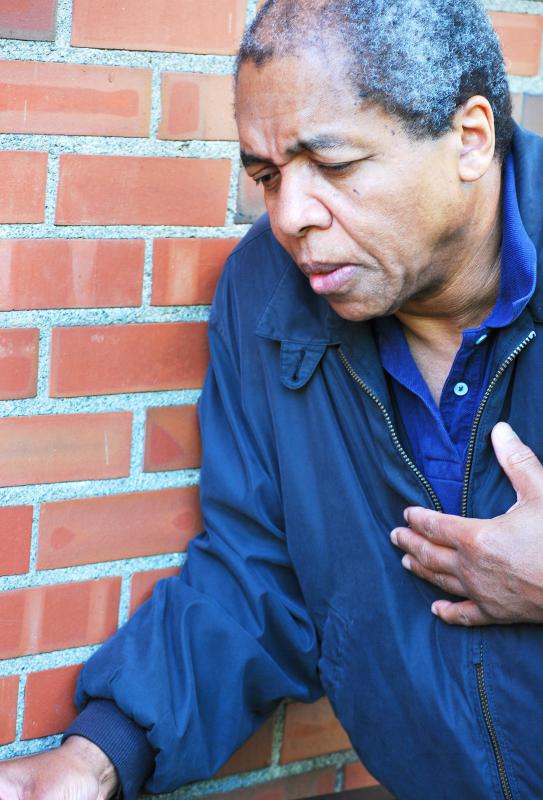At WiseGEEK, we're committed to delivering accurate, trustworthy information. Our expert-authored content is rigorously fact-checked and sourced from credible authorities. Discover how we uphold the highest standards in providing you with reliable knowledge.
What is Carditis?
Carditis is a general term for inflammation of heart tissue. The condition is categorized into three different disorders, depending on where inflammation occurs. Endocarditis refers to inflammation of the inner heart tissue, myocarditis affects the middle heart muscle, and pericarditis is irritation of the outer heart membrane. An individual who suffers from any type of carditis is likely to experience chest pains, shortness of breath, and fatigue. Most cases of carditis are caused by bacterial infections, viruses, or underlying health conditions, and tend to clear up with prescription medications.
Endocarditis and myocarditis are typically a result of bacteria entering the bloodstream and attaching to heart tissue. The most common symptoms of endocarditis are fatigue, coughing, chest pain, chills, and shortness of breath, though a person may also notice swelling in the hands and feet and blood in the urine over time. Myocarditis can result in similar symptoms, as well as a rapid heartbeat and sharp, shooting heart pain.

The heart is surrounded by a protective, fluid-filled sac known as the pericardium. The sac can become inflamed and irritated due to a viral infection, chest trauma, or other diseases such as lupus, rheumatoid arthritis, and cancer. Pericarditis can be acute or chronic, meaning its onset can be quick and severep or it may get progressively worse over a period of time. Acute pericarditis usually results in sharp chest pains, shortness of breath, and extreme fatigue. Chronic conditions are often painless at first, but symptoms such as difficulty breathing and swelling in the extremities tend to develop after about six months.

All three types of carditis are diagnosed similarly. A doctor usually asks a patient about his or her medical history and conducts a quick physical examination. The physician usually employs an electrocardiogram machine to monitor the electrical activity of the heart. A patient may also receive a chest x-ray or other tests to give the doctor a better picture of the problem. Once carditis has been diagnosed, the physician can determine the best treatment methods.

Most cases of myocarditis and endocarditis are treated with antibacterial or antiviral oral medications. Doctors usually suggest that patients with these conditions get plenty of rest and maintain healthy lifestyle choices to prevent the condition from worsening. An individual with pericarditis may receive anti-inflammatory drugs and painkillers. If a case of carditis does not go away within a month or continues to come back over time, doctors usually recommend surgical procedures to remove or replace inflamed tissue.
AS FEATURED ON:
AS FEATURED ON:


















Discussion Comments
@cloudel - Be glad you went to the doctor for your acute pericarditis. I let mine go until it developed into chronic pericarditis, and I had to have surgery to fix it.
The fluid in my pericardium increased and developed pus because of an infection. This made me have chest pains that worsened when I laid down. I got a fever, I felt tired all the time, and I experienced fast, suddenly strong heartbeats.
I am just really stubborn about going to a doctor. My nephew finally made me go. I got a blood test and imaging tests, and once diagnosed, I had to have a balloon pericardiotomy. This is where they use a small balloon to carve a hole in the heart sac so that fluid can get out.
After all this, I had to be on steroids and antibiotics for awhile. I sure wish I had gone sooner so that I could have avoided the cost of surgery.
I had acute pericarditis two years ago. It was quite painful. The pericardium has two layers of tissue. Mine became inflamed and rubbed against my heart, causing chest pains.
This pain was stabbing and sharp. I had a fever along with it, and I also felt weak. I coughed a lot and had trouble breathing.
My doctor told me that before doing anything major, I should start with just taking ibuprofen for pain and inflammation. I tried this, but the pain persisted. Next, he gave me a steroid and antibiotics. These medications helped a lot. This meant that an infection had been the cause of my pericarditis.
Myocarditis nearly killed my mother. If the doctor had not caught it in time, she could have developed blood clots in her heart and had a stroke or heart attack.
For awhile, her heartbeat had been abnormal and rapid at times. She felt short of breath even while sitting. Her legs, feet, and ankles had swollen, and she felt tired most of the time. She attributed all these things to being overweight and getting old, but my sister and I insisted that she get checked out.
Her doctor did an MRI and an ECG, and he found that she had myocarditis. He put her on beta blockers to control her erratic heartbeat and reduce her heart’s workload. He gave her antibiotics to treat the underlying infection.
He also told her to avoid exercise and exerting herself for three months to allow her heart to heal. During this time, she had to eat very little salt and not drink too many fluids.
My aunt had endocarditis, and she also had a damaged heart valve. This rough spot gave the bacteria a place to settle and infect. They attached there and multiplied.
Her joints and muscles ached, and she got night sweats with fever and chills. Her limbs swelled, and she asked her doctor what was going on with her.
He touched her abdomen where her spleen is located to check for tenderness. When she yelled out in pain, he knew that she probably had endocarditis. He did an ECG and a chest X-ray, which confirmed it.
He started her on antibiotics through an IV. After two weeks, he let her come home, but she had to go back to his office for regular visits, during which she received her antibiotics intravenously.
Post your comments